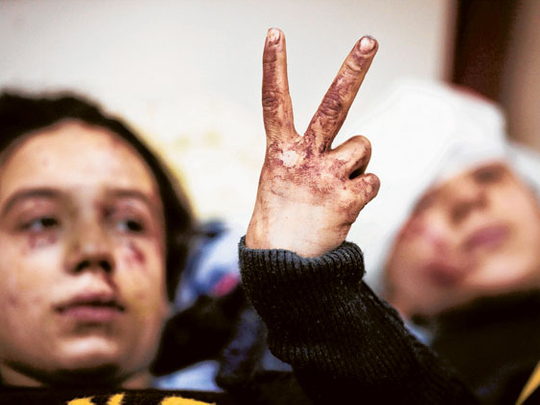
London: Syrians detained during a year-long uprising against President Bashar Al Assad's rule have been subjected to widespread torture that amounts to a crime against humanity, Amnesty International said on Wednesday.
The rights group said the situation in Syria should be referred to the prosecutor of the International Criminal Court. However, only the United Nations Security Council can do that and it is divided over the violence in Syria.
Amnesty's report, based on interviews last month with Syrians who had fled to Jordan, documents 31 methods of torture or other ill-treatment meted out by security forces, army and pro-government armed gangs, described by witnesses or victims.
"The testimony presented in this report, taken in the context of other human rights violations committed against civilians in Syria, is yet further evidence that torture and other ill-treatment in Syria form part of a widespread and systematic attack against the civilian population, carried out in an organised manner and as part of state policy and therefore amount to crimes against humanity," Amnesty said.
Forced to watch rape
The former detainees interviewed by Amnesty in Jordan said they had suffered or witnessed methods of torture including beatings on all parts of the body, cigarettes stubbed out on the body, electric shocks, or being forced to watch the rape of another detainee.
Other methods included forcing a detainee into a tyre, which was then hoisted up and the person beaten; beating on the soles of the feet; and the so-called "flying carpet" where a victim is strapped face-up onto a foldable wooden board, the ends of which are moved towards each other, hurting the detainee's back at the same time as the victim is beaten, the report said.
An 18-year-old student identified only as Karim told Amnesty his interrogators used pincers to remove flesh from his legs when he was being held at an Air Force Intelligence branch in Deraa in December 2011.
Another former detainee, named Tareq, told Amnesty during his interrogation at the Military Intelligence branch in Kafr Sousseh, Damascus, in July 2011 he was forced to watch the rape of another prisoner.
Amnesty said people were almost invariably beaten and otherwise tortured and ill-treated during arrest, often during transportation to detention centres, and routinely upon arrival at the detention centres and afterwards. Among the victims were children aged under 18, it said.












